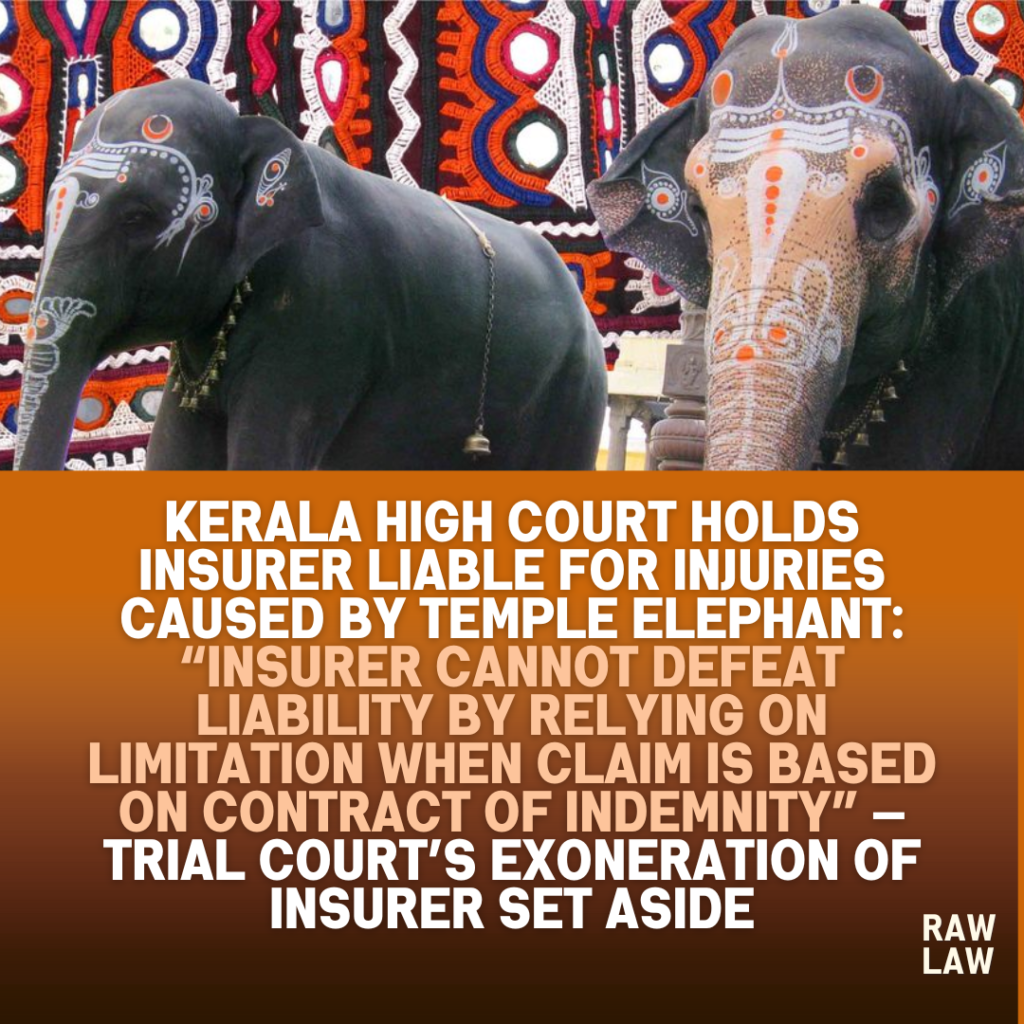Judgment Name: Kuttankulangara Devaswom v. C.P. Raghava Pisharadi & Ors.
Date of Judgment: 18 June 2025
Coram: Justice C. Pratheep Kumar
Court: High Court of Kerala, Ernakulam
Court’s Decision
The Kerala High Court allowed the Regular First Appeal filed by the Devaswom, holding that the insurance company, which had insured the elephant responsible for the incident, could not evade liability on the ground that it was impleaded after the limitation period. The Court set aside the trial court’s exoneration of the insurer and directed the insurance company to pay the ₹75,000 compensation awarded by the trial court to the injured artist.
Facts
The suit arose from an incident during the Kozhimamparambu Pooram festival on 07.03.2007, where the plaintiff—an artist performing the ‘Elathalam’ as part of the Panchavadhyam team—was attacked by an elephant named ‘Kuttankulangara Ramadas’ owned by the Devaswom. The elephant turned violent, stamped the plaintiff, and caused severe physical injuries including fractures, leading to two surgeries and ₹75,000 in medical expenses.
The artist sued the Devaswom (owner), the Pooram Committee (organizer), and subsequently, the insurer after discovering that the elephant was covered under a valid policy.
Issues
- Whether the impleadment of the insurer after the limitation period bars the claim?
- Whether the trial court erred in exonerating the insurer from liability?
Petitioner’s Arguments (Devaswom)
The Devaswom contended that since the elephant was insured, the insurer should bear the liability. The trial court erred in saddling the Devaswom with the entire compensation burden and exonerating the insurer on the technical ground of limitation.
Respondent’s Arguments (Insurer)
The insurer argued that since it was impleaded after the three-year limitation period (incident in 2007, impleaded in 2014), it could not be made liable. It relied on:
- Order I Rule 10(5) CPC
- Section 21 of the Limitation Act
to contend that the suit, as far as it pertained to them, was time-barred.
They cited:
- Mahadeva Rao v. S.G. Chickanageswariah [1981 KHC 1837]
- Ramalingam Chettiar v. Pattabiraman [(2001) 4 SCC 96]
- Joseph K.J v. Manager, New India Assurance Co. [2014 (10) KHC 607]
- Chami Narayanan v. Krishna Iyer [1998 KHC 390]
Analysis of the Law
The Court interpreted Order I Rule 10(5) CPC and Section 21(1) of the Limitation Act in light of the contractual relationship between the insurer and the insured. It clarified that these provisions apply only when the plaintiff has an independent cause of action against the newly added defendant.
Here, the insurer was impleaded only after the Devaswom disclosed the insurance contract. Thus, the plaintiff had no independent cause of action against the insurer and was unaware of their identity or existence prior to the Devaswom’s disclosure.
The Court emphasized that Section 21(1)’s proviso allowed the Court to backdate the deemed institution of the suit if the omission was due to a bona fide mistake.
Precedent Analysis
- Kerala State Insurance Dept. v. P. Rajan [2022 (94) KLJ 500]
- The Court had previously held that when a party is added later due to a bona fide mistake, the benefit of Section 21’s proviso must be given.
- The Court had previously held that when a party is added later due to a bona fide mistake, the benefit of Section 21’s proviso must be given.
- Oriental Insurance Co. v. Ananda Pai [2002 KHC 57]
- Held that insurers who act as indemnifiers cannot evade liability for interest or compensation by claiming delayed impleadment.
The High Court held that both these decisions were applicable and binding in the present scenario.
Court’s Reasoning
The Court found that:
- The insurer was impleaded based on a contract to indemnify the Devaswom.
- The plaintiff was unaware of this contract at the time of filing the suit.
- Impleadment was not due to any wilful delay or omission.
- Hence, the insurer’s claim of limitation was misplaced and unsustainable.
Conclusion
The Court allowed the appeal, set aside the trial court’s decision exonerating the insurer, and directed the insurer to pay ₹75,000 as compensation to the plaintiff.
“The insurer cannot take a contention that they are not liable to indemnify the defendant and thereby defeat the very purpose for which the insurance policy was taken.”
Implications
This judgment reinforces the principle that insurers who undertake to indemnify insured parties cannot avoid liability merely due to procedural delays in impleadment, particularly when the plaintiff had no knowledge of the insurer’s role at the time of filing the suit. It extends the equitable application of Section 21’s proviso of the Limitation Act beyond motor accident claims to tortious injury claims involving animal attacks.
Summary of Judgments Cited and Their Role
- Mahadeva Rao (1981), Ramalingam Chettiar (2001), Joseph K.J (2014), Chami Narayanan (1998) – These were relied upon by the insurer to argue limitation bars liability. The Court distinguished them on facts.
- Kerala State Insurance Dept. v. P. Rajan (2022) – Held that impleadment after limitation due to a mistake should not defeat the claim.
- Oriental Insurance v. Ananda Pai (2002) – Reinforced that insurers cannot avoid liability merely due to late impleadment when their role is purely indemnificatory.



